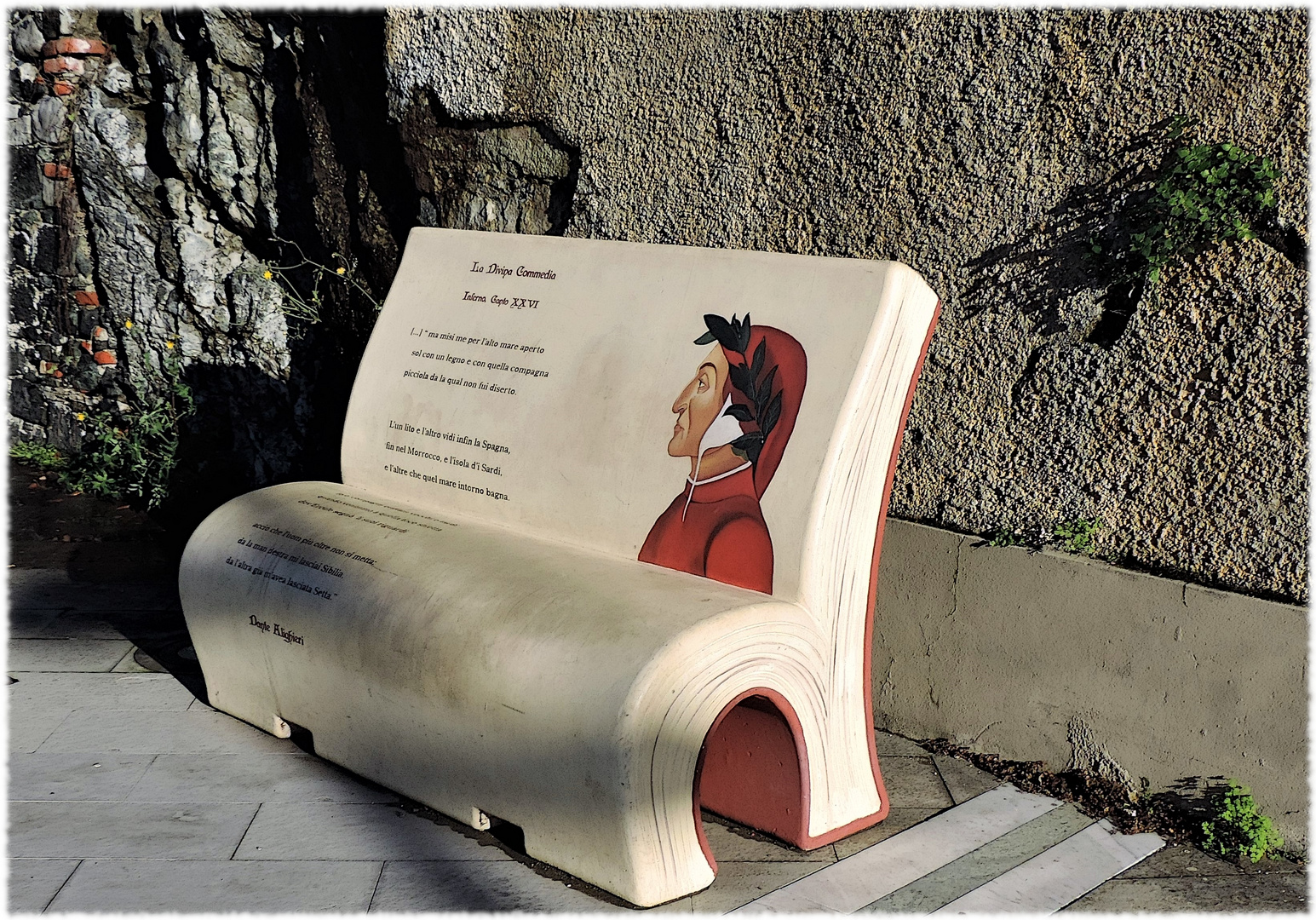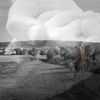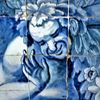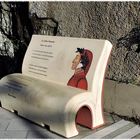Un angolo di cultura
"....ma misi me per l’alto mare aperto
sol con un legno e con quella compagna
picciola da la qual non fui diserto.
L’un lito e l’altro vidi infin la Spagna,
fin nel Morrocco, e l’isola d’i Sardi,
e l’altre che quel mare intorno bagna.
Io e’ compagni eravam vecchi e tardi
quando venimmo a quella foce stretta
dov’Ercule segnò li suoi riguardi
acciò che l’uom più oltre non si metta;
da la man destra mi lasciai Sibilia,
da l’altra già m’avea lasciata Setta...."
Dante Alighieri
La Divina Commedia - Inferno, Canto XXVI
/********************************************************/
Questa panchina riporta l'effige di Dante Alighieri, che è considerato il padre della lingua italiana e scrisse la più grande opera di letteratura italiana:"la Divina Commedia".
Il poema è diviso in tre parti, chiamate «cantiche» : Inferno, Purgatorio e Paradiso e Dante riprende nel cantico dell'Inferno molti temi, tra cui quello della morte di Ulisse per mare (che ci viene anche offerto dall’Odissea stessa, quando l’indovino Tiresia gli confida che dopo il ritorno ad Itaca - egli riprenderà a viaggiare e che troverà la morte , che sarà per lui dolce, in mare)
/********************************************************/
Diese Bank trägt das Bildnis von Dante Alighieri, der als Vater der italienischen Sprache gilt und das größte Werk der italienischen Literatur schrieb: "Die Göttliche Komödie".
Das Gedicht ist in drei Teile unterteilt, die "cantiche" genannt werden. Inferno, Fegefeuer und Paradies. Im Inferno greift Dante das Thema des Todes von Ulysses auf dem Meer auf (das uns in der Odyssee selbst angeboten wird, als der Wahrsager Tiresias ihm sagt, dass er nach seiner Rückkehr nach Ithaka wieder auf Reisen gehen und den für ihn süßen Tod auf dem Meer finden wird)
/********************************************************/
This bench bears the effigy of Dante Alighieri, who is considered the father of the Italian language and wrote the greatest work of Italian literature: 'The Divine Comedy'.
The poem is divided into three parts, called 'cantiche'. Inferno, Purgatory and Paradise. In the Inferno canticle, Dante takes up the theme of Ulysses' death at sea (which is offered to us by the Odyssey itself when the soothsayer Tiresias tells him that, after returning to Ithaca, he will start travelling again and that he will find death, which will be sweet for him, at sea)
/********************************************************/
Ce banc est à l'effigie de Dante Alighieri, considéré comme le père de la langue italienne et auteur de la plus grande œuvre de la littérature italienne : "La Divine Comédie".
Le poème est divisé en trois parties, appelées "cantiche". L'Enfer, le Purgatoire et le Paradis. Dans le cantique de l'Enfer, Dante reprend le thème de la mort d'Ulysse en mer (qui nous est offert par l'Odyssée elle-même lorsque le devin Tirésias lui dit qu'après être rentré à Ithaque, il recommencera à voyager et qu'il trouvera la mort, qui lui sera douce, en mer)
/********************************************************/
Este banco tem a efígie de Dante Alighieri, que é considerado o pai da língua italiana e escreveu a maior obra da literatura italiana: 'A Divina Comédia'.
O poema está dividido em três partes, chamadas 'cantiche'. Inferno, Purgatório e Paraíso. No cântico do Inferno, Dante retoma o tema da morte de Ulisses no mar (que nos é oferecido pela própria Odisseia quando o adivinho Tiresias lhe diz que, depois de regressar a Ítaca, voltará a viajar e que encontrará a morte, que será doce para ele, no mar)























Marina Luise 31/01/2023 7:22
Eine sehr kreative und schöne Idee für eine Bankgestaltung!Lila 28/01/2023 0:43
eine interessante Bank , klasse gezeigt !Alfred Photo 27/01/2023 7:05
Für Kunst und Komödie muss man sich Zeit lassen.Da ist so eine kunstvoll hergestellte Bank genau das richtige
VG
Alfred
- ermano - 26/01/2023 18:04
- sehr fleißig und informativ getextet - besten Dank dafür !! -LG. -
- ermano -
Roland Kurth 25/01/2023 22:50
Eine Nische der Kultur! ... sehr schön in die Szenerie Dante Alighieri eingebunden. Gefällt mir gut!Jörg Wolfshöfer 22/01/2023 23:04
Ein tolles Foto dieser schönen als Buch gestalteten Bank! LG Jörg.Charly08 22/01/2023 23:01
Eine schöne Bank, danke für dieInformation dazu. LG Gudrun
jbd68 22/01/2023 22:57
Dante Alighieri ist dann wohl der italienische Goethe?! Schöne Aufnahme. VG BjörnVitória Castelo Santos 22/01/2023 19:04
OTTIMA IDEA E FOTOBRAVO
Alfredos click 22/01/2023 18:26
Da darf nur eine Person sitzen damit man die Komödie lesen kann,oder ??Jedenfalls ein schönes Foto mit einer sehr Eindrucksvolle Erklärung des Geschichtlichen Hintergrundes der Bank.
Liebe Grüße von Alfredo, schönen Sonntag Abend wünsche ich Dir Stefania.
Robert Buatois 22/01/2023 16:56
Hommage mérité à cet homme qui était poète, écrivain et homme politique. Ce banc dédié à lui est magnifique. L'Italie le lui devait bien.J'aime bien le jeu de lumière qu'il y a dans ta prise de vue.
Amitiés et bonne fin de dimanche
Herr Mato 22/01/2023 16:36
Una foto splendida!Anche qui - su questa panchina - si può vedere come si intrecciano le storie dei Paesi europei. Quella dell'Italia e della sua grande lingua con l'antica mitologia greca e l'ampia diffusione delle opere di Dante, 200 anni dopo, quando Gutenberg aveva inventato la tipografia - allora la base del "libro per tutti".
Paolo Luxardo 22/01/2023 16:19
LevantoAnsgar Leuthner 22/01/2023 15:50
..immortal lyrics from an immortal poet! In France or in your country you can always find some places which are dedicated to a man or woman of literature, you can find statues and other reminders....In Germany, which called itself the land of "Dichter und Denker"...you only find Goethe and Schiller.....This is a nice place and a nice idea: but to be honest - is there anyone in Italy who reads "The divine comedy"? Ciao, cara Stefania, buona serata! AnsgarHeinrich Bross 22/01/2023 14:44
Danke für die interessante Geschichte zum Foto,auch das Foto gefällt mir sehr gut.LG Heiner